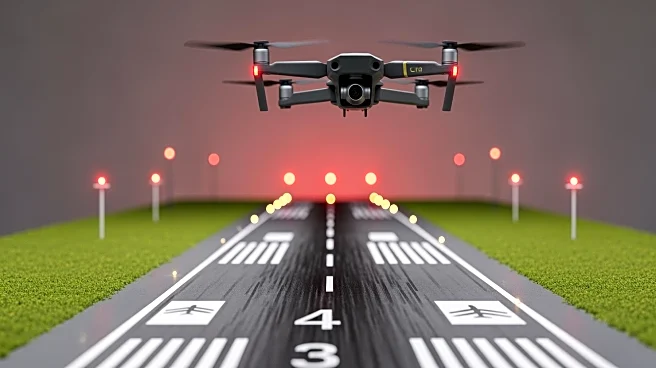What's Happening?
Brussels and Liege airports in Belgium were temporarily closed due to drone sightings, causing significant disruption to air travel. The Belgian air traffic control service reported the sighting of a drone near
Brussels Airport, leading to its closure as a security precaution. The airport briefly reopened but was closed again following additional drone sightings. As a result, 15 outbound flights were unable to take off, and eight incoming flights were diverted to other airports. Liege Airport, primarily a cargo hub, also experienced closures due to similar drone activity. The incidents follow recent drone sightings over a Belgian military air base, raising concerns about security and airspace safety.
Why It's Important?
The closure of Brussels and Liege airports due to drone sightings underscores the growing challenge of managing unauthorized drone activity in critical airspace. This incident highlights the potential security risks and operational disruptions that drones can cause, affecting airlines, passengers, and cargo operations. The temporary airport closures resulted in flight diversions and delays, impacting travel plans and logistics. The situation also raises broader concerns about airspace security and the need for effective measures to detect and mitigate drone threats, especially in light of similar incidents across Europe.
What's Next?
Authorities in Belgium are likely to investigate the drone sightings to identify the operators and assess the security implications. Enhanced surveillance and monitoring measures may be implemented to prevent future disruptions and ensure airspace safety. Airlines and airport operators may need to review and update their contingency plans to address potential drone-related incidents. Additionally, the incidents may prompt discussions at the European level regarding regulations and technologies to manage drone activity and protect critical infrastructure.
Beyond the Headlines
The drone sightings at Brussels and Liege airports reflect a broader trend of increasing drone activity and its implications for airspace management. This situation highlights the need for international cooperation and regulatory frameworks to address the challenges posed by drones. It also raises ethical and legal questions about the use of drones in sensitive areas and the balance between technological innovation and security concerns. As drone technology continues to evolve, stakeholders must navigate these complexities to ensure safe and secure airspace operations.










